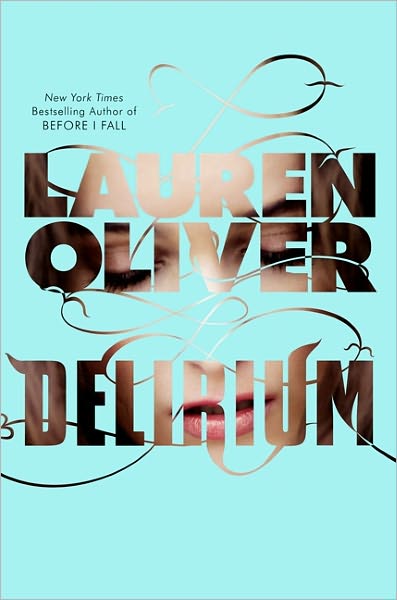published February 2011 by HarperCollins
441 pages (hardcover), YA
In the near future, the borders of the United States have been completely closed, borders to individual states and cities similarly regulated, and the greatest threat to society is the disease amor deliria nervosa - or what we know simply as love. Fortunately, a cure has been found for this vicious disease and is administered to most teens when they turn 18.
Lena can't wait to get the cure, to finally be rid of rumors and whispers about her mother, who committed suicide because the cure just didn't work on her - she didn't want it to. But Lena has always believed in the dangers of the disease and the safety of her controlled life. Until she meets Alex. He first shows up unexpectedly at her Evaluation (which will determine her choice of mate) then again as she is running with her best friend Hana and they stop to explore a restricted area. She's never really talked to a guy before - there are strict rules about segregating uncured boys and girls - and she feels strangely around Alex. Luckily, he's already been cured, so it's safe for them to talk. Safe. Right. Suffice to say, it's a classic case of boy shows girl how sheltered her life really is and how different it could be.
I love this book. You know me, I can't resist a YA dystopia, and neither can you, I'm sure, but that's not why I love this book. I love it because it doesn't have to be a dystopia. This story is all too familiar - teenagers with their reckless abandon and intense emotions get what life is all about, while adults slug on by, devoid of that spark of life they once had. This quote says it better:
Most of us won't see one another after graduation, and even if we do it will be different. We'll be different. We'll be adults--cured, tagged and labeled and paired and identified and placed neatly on our life path, perfectly round marbles set to roll down even, well-defined slopes.I don't think I'm reading too much into it when I think about how some adults in today's society completely shed any sense of adventure, curiosity, passion, art, or anything interesting at all about themselves once they outgrow their teens (and maybe now twenties) and enter "the real world." As if there's something magical and carefree about being young that can't be carried through to adult life. Sure, we have more responsibilities and most of us choose professions that require us to keep a schedule and live a certain, stable way, but all is not lost! There's too much beauty in the world to get bogged down by work and responsibilities. Yes, that's a friendly reminder to myself. And a tangent, I know.
Back to the story - Lena goes through many changes in this book. She has a carefree spirit that sometimes peeks out, but she is usually cautious and afraid. I loved reading about her childhood, those brief moments with her mother when they would sing and dance in their home (with the blinds shut, of course), in comparison to her current life of daily routines and anticipation of the cure. Some have criticized her character as not being believable because of this stark contrast, but it makes perfect sense to me. Her mother's life (and death) serves as a cautionary tale, and even though she still has those warm, fuzzy feelings of the past, she knows they need to stay hidden for fear of triggering the disease. Well, you know, until Alex turns her world upside down. That's when Lena's character gets real interesting, but I won't go there.
This is a book to be read and shared and discussed. Which is why it's hard for me to write about it. So, I'll leave you with another of my favorite quotes:
One of the strangest things about life is that it will chug on, blind and oblivious, even as your private world - your little carved-out sphere - is twisting and morphing, even breaking apart. One day you have parents; the next day you're an orphan. One day you have a place and a path. The next day you're lost in the wilderness.
And still the sun rises and clouds mass and drift and people shop for groceries and toilets flush and blinds go up and down. That's when you realize that most of it - life, the relentless mechanism of existing - isn't about you. It doesn't include you at all. It will thrust onward even after you've jumped the edge. Even after you're dead.
Also reviewed by:
YA Reads ; Bookworming in the 21st Century ; Becky's Book Reviews ; Fantastic Book Review ; Confessions of a Bibliovore ; Candace's Book Blog ; The Neverending Shelf ; and many others















2 comments:
fantastic review! I love the connections you made and I agree 100%. I really liked this one and just recently pick up a hard copy of it as I gave my ARC copy away and I know my students will love this too.
I love this review, almost as much as I loved this book. You're a great writer.
Post a Comment